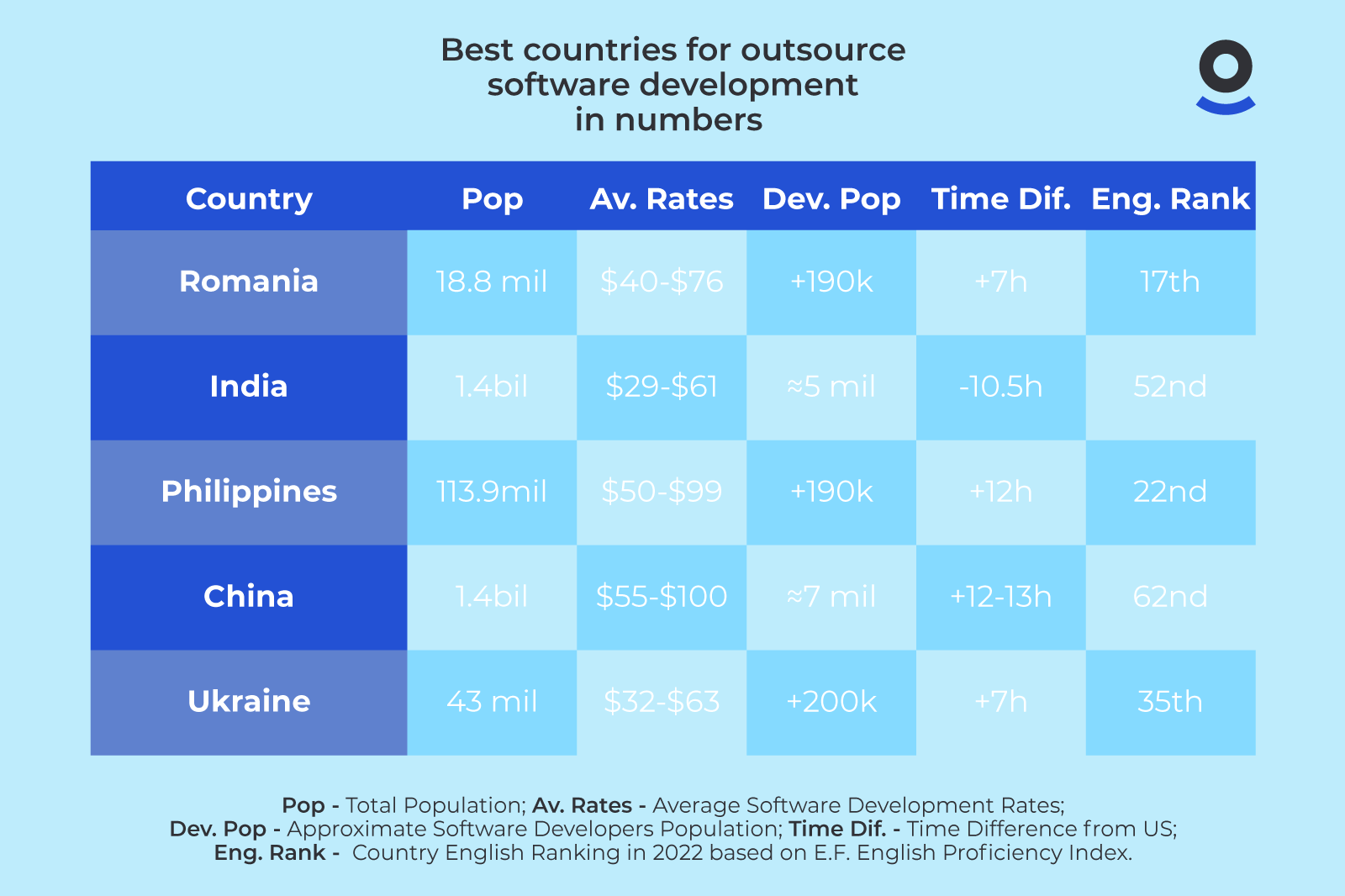
Unlocking Global Talent: The Best Countries to Outsource Software Development
Outsourcing software development is an increasingly popular strategy for companies looking to stay competitive in today's fast-paced business environment. But with so many countries and cities to choose from, it can take time to determine which location best fits your needs. In this article, we'll take a closer look at some excellent choices for outsourcing software development.
Discover the step-by-step process to outsource software development projects.
Key Factors to Consider When Choosing a Country for Outsourcing Software Development Projects
When outsourcing software development, it's essential to consider several factors to select the ideal outsourcing partner. Here are the critical factors to keep in mind:
- Skilled workforce: Developers should have expertise in specific technologies and programming languages needed for the project and experience in software development best practices. A robust education system and focus on innovation and technology in the chosen country ensure a continually improving workforce.
- Cost of outsourcing: Lower prices can be attractive, but you should also consider the quality of work received for your investment. Cheaper rates may mean sacrificing quality or working with developers with limited experience. It's crucial to balance cost and quality and choose a country offering competitive rates without sacrificing expertise.
- Cultural compatibility: Look for a country where the business culture aligns with your own, with similar work ethics and communication styles. Language skills are also necessary, as effective communication is essential for successful collaboration.
- Political and economic stability: A stable business environment assures that the outsourcing partner can complete the project as agreed upon without any unexpected interruptions or delays.
Considering these key factors, you can make an informed decision when selecting the best country to outsource your software development projects.
Some of the 5 Best Countries for Outsourcing Software Development
-
Romania
Boasting a highly educated workforce, Romania offers a favorable European location and a more culturally compatible business environment than other popular outsourcing destinations.
- Population: 18.8 million;
- The average rate for software development services: is $40-$76 per hour (as an average of the minimum and maximum fees taken from Cluth.co);
- Software developer population: Over 190.000;
- Time zone difference compared to the U.S.: 7 hours ahead of the the U.S.;
- English language proficiency: English is widely spoken, particularly among the younger generation. Romania ranked 17th out of 100 countries in the E.F. English Proficiency Index in 2022.
2. India
Known for its vast pool of highly skilled engineers and low labor costs, India also offers a favorable time zone for businesses operating in North America.
- Population: 1.4 billion;
- The average rate for software development services: is $29-$61 per hour (as an average of the minimum and maximum fees taken from Cluth.co);
- Software developer population: Almost 5 million;
- Time zone difference compared to the U.S.: 10 hours & 30 minutes ahead of the U.S.;
- English language proficiency: English is widely spoken in India, particularly in the I.T. industry. India ranked 52nd out of 100 countries in the E.F. English Proficiency Index in 2022.
3. Philippines
The Philippines provides an English-speaking workforce with solid cultural compatibility with the West, low labor costs, and a relatively stable political climate.
- Population: 113.9 million;
- The average hourly rate for software development: is $50-$99 (as an average of the minimum and maximum fees taken from Cluth.co);
- Software developer population: over 190.000;
- Time zone difference to U.S. Eastern Time: 12 hours ahead;
- English Language Proficiency: High, as the Philippines ranked 22nd in the E.F. English Proficiency Index in 2022.
4. China
With a large population and lower labor costs than many other outsourcing destinations, China has a highly skilled workforce and a rapidly developing technology sector.
- Population: 1.4 billion;
- The average hourly rate for software development: is $55-$100 (as an average of the minimum and maximum fees taken from Cluth.co);
- Number of software developers: around 7 million;
- Time zone difference to U.S. Eastern Time: 12-13 hours ahead;
- English Language Proficiency: Low to moderate - around 10% of the population speaks English fluently. China was ranked 62nd in the E.F. English Proficiency Index in 2022.
5. Ukraine
Offering a highly skilled workforce in software development and a relatively low labor cost, Ukraine is also situated in a favorable time zone for businesses operating in Europe.
- Population: 43 million;
- The average rate for software development services: is $32-$63 per hour (as an average of the minimum and maximum fees taken from Cluth.co);
- Software developer population: Over 200,000;
- Time zone difference compared to the U.S.: 7 hours ahead of the U.S;
- English language proficiency: While English is less widely spoken than it is in Romania, there is a growing number of English-speaking software developers in Ukraine. Ukraine ranked 35th out of 100 countries in the E.F. English Proficiency Index in 2022.

How to Choose the Right Country for Outsourcing Software Development Projects
Choosing the right country for outsourcing software development can be a daunting task.
There are many factors to consider, such as cost, quality, language barriers, cultural differences, time zone differences, etc. Here are some tips on how to choose the right country for your outsourcing needs:
- Determine your budget: One of the main reasons companies outsource software development is to save money. Determine your budget and look for countries that offer competitive rates.
- Consider the quality of work: Cost should not be the only factor to consider. Look for countries with a reputation for producing high-quality work and a skilled workforce.
- Language proficiency: Communication is vital to the success of any outsourcing project. Look for countries where the population speaks fluent English or the language of your choice.
- Cultural fit: Cultural differences can lead to misunderstandings and project delays. Look for countries that share your business values and have a similar work culture.
- Time zone differences: Time zone differences can affect communication and collaboration. Consider countries with similar or overlapping time zones to your business hours.
- Intellectual property protection: Protecting your intellectual property is critical. Look for countries that have strong intellectual property laws and enforcement.
- Political stability: Political instability can lead to business disruptions and project delays. Look for countries that have a stable political climate.

Why Romania and Cluj-Napoca Are Excellent Choices for Outsourcing Software Development Projects
- Technical expertise: Romania, and Cluj-Napoca in particular, has a large pool of highly skilled developers with advanced computer science and engineering degrees, as well as a thriving tech industry;
- Cost-effectiveness: One of the most attractive aspects of outsourcing software development is the cost savings it can provide. Compared to other European cities, the cost of living and wages in Cluj-Napoca is relatively low, so you can hire highly skilled developers at a lower price than you would in other locations. This can help you keep your software development projects within budget without sacrificing quality.
- Cultural fit: Cultural fit is essential when outsourcing software development. Romania's culture is similar to other European countries, meaning there are few cultural barriers or misunderstandings when working with Romanian developers. Additionally, most Romanian developers are fluent in English, which can help to facilitate communication and collaboration.
- Infrastructure: Romania and Cluj-Napoca boast reliable and efficient I.T. infrastructure, with high-speed internet connections and robust telecommunications networks.
- Government incentives: The Romanian government offers various stimuli, including tax breaks, grants, and subsidies, to attract foreign companies to invest in the country. These incentives can offset the cost of outsourcing software development to Cluj-Napoca.
Ease of Collaboration and Growing Startup Ecosystem in Cluj-Napoca
- Collaboration opportunities: Cluj-Napoca's active tech community organizes various networking events, conferences, and meetups that provide excellent opportunities to connect with other professionals, share knowledge, and collaborate on projects. This vibrant community fosters innovation and encourages continuous learning, which can benefit your outsourcing projects.
- Travel accessibility: Cluj-Napoca is easily accessible by air, with an international airport offering direct flights to and from major European cities. This ease of travel simplifies face-to-face meetings, on-site visits, and collaboration, making it more convenient for businesses that must maintain a close relationship with their outsourcing partners.
- Growing startup ecosystem: Cluj-Napoca has a thriving startup ecosystem with numerous tech startups, incubators, and accelerators. This entrepreneurial environment attracts talent and investment, further solidifying Cluj-Napoca's position as a leading outsourcing destination for software development.
In summary, when considering the best countries to outsource software development, Romania and its city Cluj-Napoca stand out for their technical expertise, cost-effectiveness, cultural fit, robust infrastructure, government incentives, ease of collaboration, travel accessibility, and growing startup ecosystem. These factors make Romania an attractive destination for companies looking to outsource their software development projects while maintaining a competitive edge in the global market.
Article written by Andreea Florescu, Recruitment Specialist
Andreea is an experienced recruitment specialist located in New York (US) who help organizations find the right person for a particular role. For the past years she was part of scaling teams for top companies in the tech world.